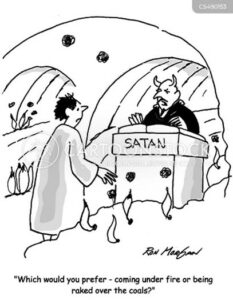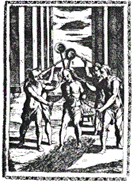Did your friend tell you their boss "raked them over the coals" at work today? This post unpacks the meaning and origin of this expression.
Meaning
The expression "raked over the coals" means to give someone a hard time for their actions or words. It defines a severe scolding by a peer or authority in your life that lets you know you did something wrong.
To be raked over the coals means you experienced a harsh rebuke of your words or actions, and you need to reconsider your position and apologize to those involved in your transgression.
Example Usage
"The boss really raked me over the coals today. I lost the Samson account, and that means we won't make our budget this month. I think they're going to fire me."
"The wife raked me over the coals for forgetting our anniversary today. I think she's going to leave me. I better pick up some chocolates and flowers on the way home."
"The guy conducting the polygraph raked me over the coals in the interview. I was so nervous, and he kept drilling me with the same questions over and over again."
"The coach raked me over the coals for missing practice last week. He said he's going to cut me from the team if I ever do it again."
"My sister raked me over the coals last week. She said I better come and see my niece, or she's going to write me off, and I'll never have a relationship with her."
"My buddy raked me over the coals for hitting on his girlfriend. I can't say I blame him, but she's so hot I can't help myself."
"The environmental group visited the mayor's office yesterday and raked him over the coals. Their list of demands was crazy."
"The teacher raked me over the coals for handing in my project late. I was supposed to complete it by the end of last week, but I only finished it on Wednesday. Now I'm in trouble."
"The president got raked over the coals during the debate. I doubt he will win a second term in office with that lackluster performance."


Origin
The expression “raked over the coals” originates from the 1500s. The phrase comes from the practice of clergymen torturing “heretics” by hauling them over hot coals.
If a person was suspected of practicing witchcraft or went against the church's traditions, they were pulled over a bed of red-hot coals to serve their penance.
If the heretic or witch survived the ordeal, they were declared innocent. The earliest record of the use of the phrase in writing comes from 1565, describing the torture process.
“S. Augustine, that knewe best how to fetche an heretike ouer the coles.”
Phrases Similar to Raked Over the Coals
- Pulled over the coals.
- Drawn over the coals.
- Severely reprimand.
Phrases Opposite to Raked Over the Coals
- Praise you.
What is the Correct Saying?
- Raked over the coals
Ways People May Say Raked Over the Coals Incorrectly
The phrase "raked over the coals" doesn't mean that someone literally pulled you over hot coals. While this was the term's original use, it no longer applies in modern society. If someone rakes you over the coals, they give you a hard time about something, not physically burn you for your transgressions.
Acceptable Ways to Phrase Raked Over the Coals
You can use the expression "raked over the coals" to describe scenarios where you receive a scolding or when someone reprimands you for your actions or words. The phrase suits social and professional situations. Use it at work to describe how the boss shouted at you for losing a big client.
Use it at home to describe how your partner yelled at you for forgetting your anniversary. The expression suits occasions where you want to describe someone giving you a hard time for something. You can use "raked over the coals" in text-based communications and verbal exchanges.